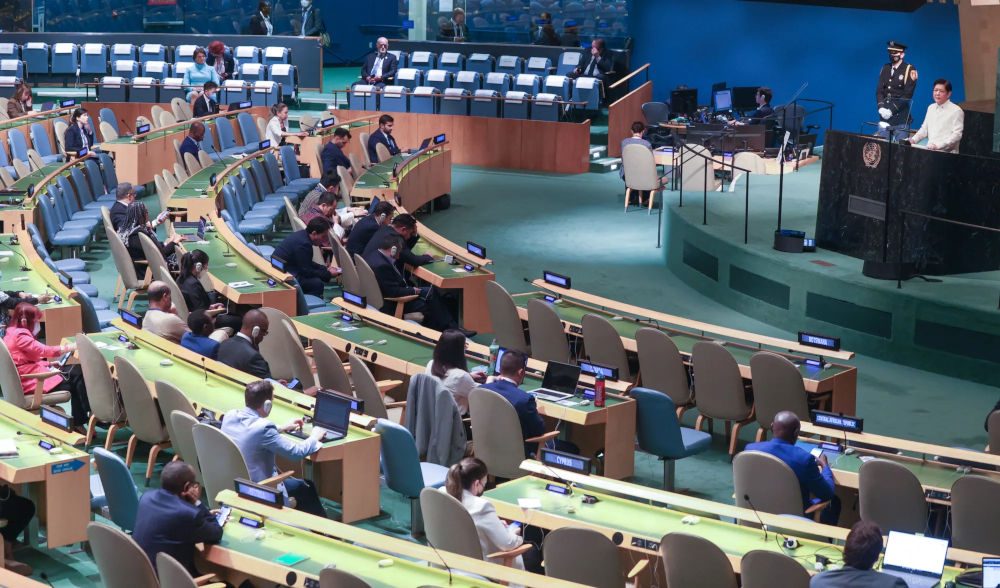SUMMARY
This is AI generated summarization, which may have errors. For context, always refer to the full article.

NEW YORK, USA – Citing the Philippines’ “experiences in building peace and forging new paths of cooperation,” President Ferdinand Marcos on Tuesday, September 20 (early morning September 21 in the Philippines) made a bid for the Philippines to earn a seat in the United Nations Security Council.
“My country’s experiences in building peace and forging new paths of cooperation can enrich the work of the Security Council. And to this end, I appeal for the valuable support of all UN Member States for the Philippines’ candidature to the Security Council for the term 2027-2028,” said Marcos, speaking before the United Nations General Assembly (UNGA) high-level General Debates.
Marcos cited in his pitch the “success” of the newly-created Bangsamoro Autonomous Region of Muslim Mindanao (BARMM), the result of years of negotiations between the Philippine government and groups led by the Moro Islamic Liberation Front (MILF).
The BARMM replaced the Autonomous Region of Muslim Mindanao (ARMM), the latter of which was touted as a “failed experiment” in granting more autonomy to Filipino Muslims in the southern Philippines.
The Philippines has been a non-permanent member of the Security Council several times before – in 1957, in 1963, from 1980 to 1981, and from 2004 to 2005.
The Security Council is the most powerful body of the UN as is tasked with maintaining “international peace and security in accordance with the principles and purposes of the United Nations.”
If through the United Nations, appeals are made and sentiments made known, it’s through that Security Council that these sentiments are turned into action.
Membership in the council comes in two forms – permanent and non-permanent. Permanent members were determined “based on their importance in the aftermath of World War II.” They are China, France, Russia, the United Kingdom, and the United States.
Permanent members have veto power in all of the council’s decisions, meaning for anything to take into effect, it must have the unequivocal support of all five permanent members.
Meanwhile, the remaining 10 seats in the council are elected by the General Assembly to two-year terms. The 10 non-permanent seats are distributed by region (Five for African and Asian States; one for Eastern European States; two for the Latin American and Caribbean States; and two for Western European and other States).
Critics have long called for reforms in the make-up and rules of the Security Council, particularly when it comes to the powers that its permanent members enjoy.
A glaring example of its shortcomings happened in February 2022, when Russia vetoed a UN Security Council resolution that would have demanded for Moscow to “immediately stop its attack on Ukraine and withdraw all troops.”
Former Philippine president Rodrigo Duterte, when he spoke before the UNGA virtually in 2021, chastized the Security Council as “neither democratic nor transparent in its representation and processes.”
The irony of Marcos citing the BARMM as a compelling reason for the Philippines’ inclusion in the Security Council is also interesting. The separatist movement in the Bangsamoro intensified because of his father, the late dictator and namesake of the current president.
Under the first President Marcos, the predominantly Muslim Bangsamoro turned into killing fields. While there are many massacres to speak of, it was the killing of Muslim trainees in Corregidor – now known as the Jabidah massacre – that galvanized the movement for Muslim self-rule.
The Moro National Liberation Front, which led the creation of ARMM and the MILF and which led negotiations for the creation of BARMM, are groups that were borne out of the struggle for self-determination and efforts to stand against the dictator.
President Marcos is in the US for a six-day working visit, with the UNGA address as only one of his many agenda. He will stay here until the 23rd and is set to have bilateral meetings with other heads of state and meetings with US businessmen. – Rappler.com
Add a comment
How does this make you feel?
![[In This Economy] Marcos’ POGO ban is popular, but will it work?](https://www.rappler.com/tachyon/2024/07/thought-leaders-marcos-pogo-ban.jpg?resize=257%2C257&crop=255px%2C0px%2C720px%2C720px)
![[Rappler Investigates] POGOs no-go as Typhoon Carina exits](https://www.rappler.com/tachyon/2024/07/newsletter-graphics-carina-pogo.jpg?resize=257%2C257&crop=424px%2C0px%2C1080px%2C1080px)



There are no comments yet. Add your comment to start the conversation.